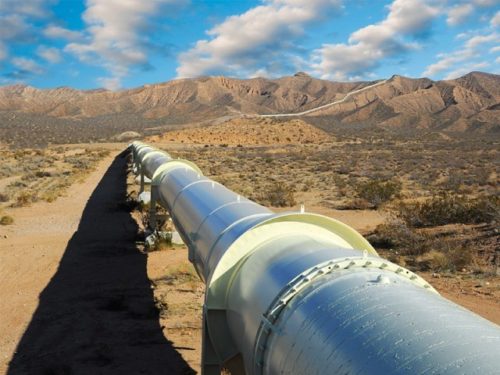ISLAMABAD: Months after tit-for-tat military attacks across the Balochistan border, Pakistan and Iran are set to move ahead on the long stalled Iran-Pakistan (IP) pipeline.
A meeting of the Cabinet Committee on Energy (CCoE) to be held on Friday (today) will be discussing the start of construction on an 80 kilometer (KM) pipeline from the Pak-Iran border to Gwadar as part of the IP Gas Pipeline Project.
The Iran-Pakistan pipeline, also known as Peace Pipeline, emerged from a plan dating as far back as 1994 and had originally included India. The $7.5 billion, 1,700-mile project would bring gas from the South Pars Gas Fields through Baluchistan (in western Pakistan) into India. Over the decades, however, the pipeline has faced multiple delays including India stepping back from the original plan in 2008.
One of the reasons for the delay have been consistent worries surrounding international sanctions on Iran. The problem is that hat if Pakistan does not start construction of the IP Gas Pipeline Project within the next three months it will have to face $ 18 billion worth penalty. Back in August 2023, Iran refused to accept Pakistan’s force majeure notice to halt construction of the multibillion-dollar Iran-Pakistan (IP) gas pipeline project and has instead granted two five-year extensions to meet the responsibilities of the IP Project.
The scheduled CCoE meeting will address the long-pending issue of construction of an 80-kilometer pipeline from the Pak-Iran border to Gwadar under the Iran-Pakistan (IP) Gas Pipeline Project. They said that the Petroleum Division has forwarded a summary containing five recommendations to the Cabinet Committee on Energy pertaining to implementation of IP gas pipeline project. They said the laying of a pipeline from the Iranian border to Gwadar may also face US sanctions while if Pakistan constructs an 80 km pipe from the Iranian borders to Gwadar, the penalty will be waived and Pakistan has received a legal opinion from an international legal firm. They said the Ministry of Finance has proposed to the petroleum division to seek the opinion of the Attorney General and the Ministry of Foreign Affairs on the matter. However, the final decision regarding implementation on the IP gas line project will be taken tomorrow by the CCoE, said sources.
This move comes as a significant development following years of setbacks and challenges faced by the project
Over the years Pakistan has postponed a decision to seek exemption from US sanctions while keeping in view the geopolitical situation in the region. Foreign legal firms have opined that Pakistan will face US sanctions if it starts construction of Iran-Pakistan (IP) Gas Pipeline Project, said the sources.
Sharing details of the proposal sent to CCoE for its consideration, sources said that Ministerial Oversight Committee (MOC), after due consideration to the discourses held with Iran during the past one year has taken following key decisions:
- Though the final draft of the Waiver Application is ready, its filling with U.S authorities is deferred due to the current geo-political situation.
- The High-Level Committee to discuss and resolve all outstanding issues with Iran including further extension of time under the French Civil Code.
3. In consideration of NIOC’s Material Breach notice, Petroleum Division has constituted vide letter No. 8(2)/2024/Dev-III/IP-Main dated 9th January 2024 the Coordination Committee in accordance with Clause 19.1.1 of the GSPA to be headed by Joint Secretary, Petroleum Division.
4. The committee recommends, subject to approval by competent authority, to start work on construction of a gas pipeline from Pak-Iran border to Gwadar (80km of the pipeline), initially, by utilising GIDC funds.
In view of the above, the petroleum division has requested the consent of the Cabinet Committee on Energy (CCoE) under Rule 23 (4) of the Rules of Business 1973 to approve the key decision taken by MOC, said sources.
Sources further told that the summary titled as ‘Iran Pakistan Gas Pipeline Project- Start of Construction on the 80KM Pipeline from Pak-Iran border to Gwadar’ was circulated to (i) Law & Justice, (ii) Ministry of Foreign Affairs, (iii) Finance Division and (iv) Ministry of Planning, Development and Special Initiatives for their views/comments. And, finance division after examining the draft summary has offered the following comments:
- To avert the possibility of an arbitral award against GoP and invoking of sovereign guarantee, the finance division endorsed the proposal of initiation of work on IP gas pipeline project. However, as review of the project and decisions of its implementation utilising GIDC funds rests with the High-Powered Project Review Board (HPPRB), the petroleum division may move the case of utilisation of GIDC funds for consideration of the GIDC Board.
- As per cost estimates of implementation of 80Km pipeline i-e USD 158 million equivalent to Rs 45 billion, to be utilised from GIDC funds, up to Rs 2.5 billion can be provided during FY 2023-24. The requirement of remaining funds amounting to Rs 42.5 billion can be considered during FY 2024-25 on approval of GIDC Board i-e HPPRB.
The petroleum division requested to obtain comments from the Ministry of Foreign Affairs (MoFA) and Attorney General Office ensuring that the implementation of the project would not invite any international sanctions or result in any international dispute involving GoP.
As per details, the Inter-Governmental Framework Declaration of the Iran Pakistan Gas Pipeline Project was signed by the President of Pakistan and Iran on 24th May 2009 for supply of gas of 750 Million Cubic Feet per Day (MMCFD) for 25 years from South Pars gas field of Iran and delivery at Pak-Iran border, near Gwadar.
The project having a length of 1,150km within Iran and 781km within Pakistan was to be implemented by each country in their respective territories. The first gas flow was to start from 1st January 2015. Iran has completed construction of over 900km within Iran, while the remaining segment of 250 is yet to be constructed by Iran.
Considering the challenges faced by Pakistan, the Government of Iran has proposed to provide financing for the project as well as EPC contractor under the Government to Government Cooperation Agreement dated 1st December 2012. The cabinet approved the cooperation agreement on 30th January 2013. Subsequently, the Iranian government unilaterally withdrew from the Government Cooperation Agreement on 17th March 2014. Pakistan, therefore, served the Force Majeure and/or Excusing Event Notice under the IP-GSPA to National Iranian Oil Company (NIOC) on 29th March 2014 after seeking Prime Minister’s approval. Accordingly, the project activities have been on hold since then.
The sources also said that the GoP has maintained engagement with Iran at two levels; Technical Committee level and Ministerial level. So far, two meetings each at the Technical Committee level and Ministerial level have been held with Iran. During these meetings, Iran was informed about the steps being taken by Pakistan regarding the project implementation including its intent to file the Waiver Application and the prospective implications on the future course of action of the project if the Waiver Application is rejected. While emphasising the urgent action by Pakistan, Iran stated that further extension of time under the French Civil Code would be subject to substantial progress by Pakistan on the project within next three months else Iran would be constrained to refer the matter to international arbitration under the GSPA. Both sides agreed to form a high-level committee to discuss all matters related to the project. Secretary Petroleum has been nominated from the Pakistan side for the High-Level Committee.

























Beyond just retrieving monetary assets, Revenant cyber hacker can restore lost Bitcoin. They have given the Bitcoin community hope, confidence, and peace of mind again. Revenant cyber hacker reliable and safe services have made them a lighthouse for people who have encountered the shadowy side of cryptocurrencies. Their commitment to helping people and companies recover what was lost is admirable, and they have played a crucial part in the resurgence of Bitcoin. They carefully analyze the situation, including wallet details and any available information, and utilize their expertise to retrieve inaccessible or lost funds. Their comprehensive process combines technical expertise, cryptography, and the latest recovery methods to maximize the chances of successful restoration. While Revenant cyber hacker has an impressive success rate in recovering lost Bitcoin, it is important to note that each case is unique. The outcome depends on various factors, such as the nature of the issue and the available information. Revenant cyber hacker team of experts works diligently to explore all possible avenues for recovery just like my case. I will advice an immediate contact with Revenant cyber hacker by using the following platform below.
Email: revenantcyberhacker ( @ ) Gmail ( . ) Com
Whatsapp: +1(272) 770-8654
Website: revenantcyberhacker ( . ) Net